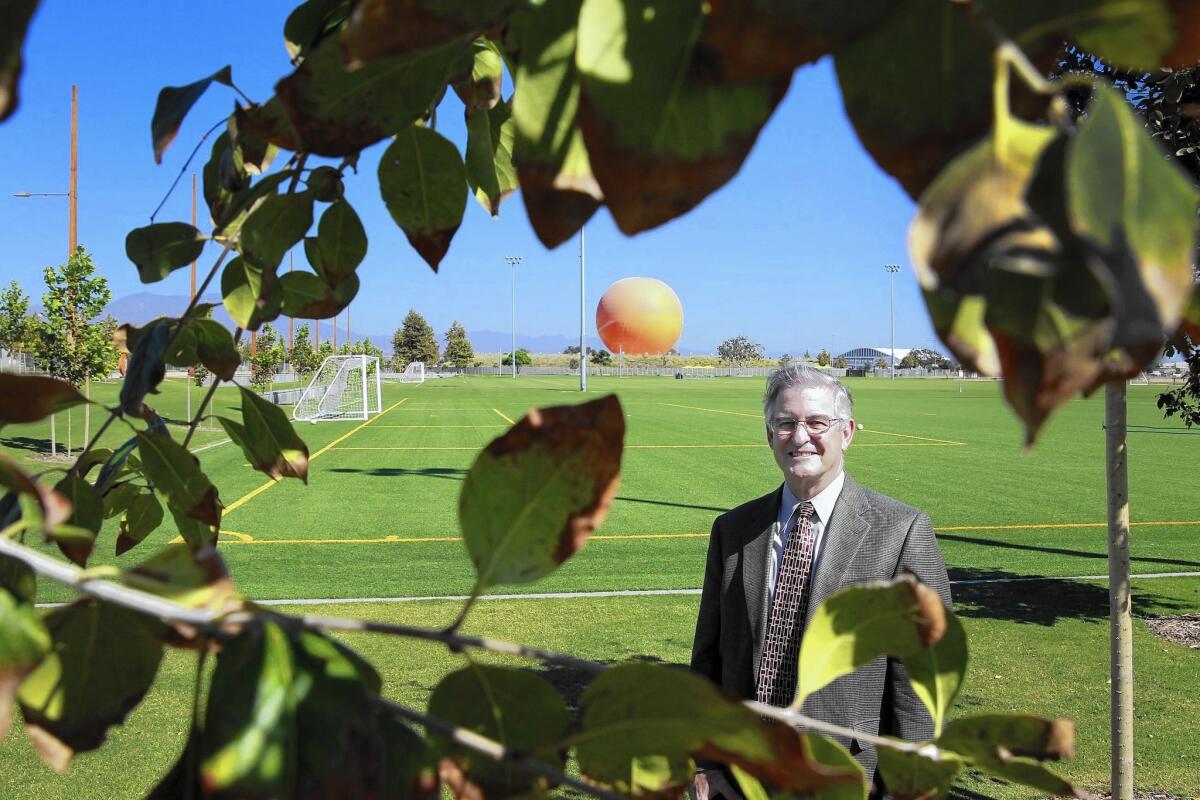Irvine voters oust Larry Agran, a decades-long fixture

Larry Agran has spent a generation as the face of Irvine as it grew from a startup community to a more cosmopolitan city recognized for its safe streets and high-performing schools, sometimes as a council member, often as its mayor.
Since 1978, he lost only one bid for reelection, in 1990, after which he left city politics and launched a quixotic campaign for president. But he returned and ran again in 1998, and voters continued to elect him like clockwork — until Tuesday.
Mired in allegations of inefficiency and cronyism regarding his oversight of the Great Park, Agran finds himself out of office, falling short of two other candidates who won seats on the five-member council.
While Agran’s reputation once held as a young, ambitious Democrat in a blossoming, meticulously planned American town, critics today describe a controlling and obstinate politician, reluctant of relinquishing any power.
The perception found weight in a preliminary audit of the expenditures for the Great Park, launched in 2013 by a new, more-conservative council majority. With more than $200 million spent so far, the park remains far from the envisioned civic space that was supposed to rival New York’s Central Park.
Agran, 69, likens the audit to a “political witch hunt.” And his election opponents employed a “campaign of smears and lies,” said council member Beth Krom, a supporter.
As Agran sees it, his is a David-and-Goliath tale, a battle to defend the public interest against powerful developers, who, he said, ultimately outspent him in support of his political foes.
“This sounds like it’s going to be a long obituary,” he said, when asked to start an interview with a discussion of the nascent beginnings of his political career.
Agran would not say whether he would attempt to remain in politics, though he indicated he’d stay involved in the city, perhaps in an elected position, or perhaps not.
Agran moved to Irvine in the mid-1970s, when his wife was a medical school student at UC Irvine, where she is now a professor emeritus. A lawyer by training, Agran got into local politics in an effort to slow rapid development.
Agran’s legacy may have been cemented with the approval of a 1988 ballot initiative for the preservation of open space, but he also points to the city’s provisions for affordable housing, balanced budgets and an early-day human rights ordinance.
“This is a guy that was just loaded with interesting ideas,” said Mark Petracca, associate professor of political science at UC Irvine.
Much more than a mainstay, Petracca said Agran “has been the — not one of — the most consequential political figure in the political development of the city.… The city’s entire progressive character, which is shared by Democrats and Republicans alike, is largely attributed to Agran.”
But the fight over how to redevelop the retired El Toro Marine base proved to be the beginning of a long downfall for Agran, who opposed plans for an international airport at the spot and became the face of the Great Park initiative in its stead.
Agran’s ambitious plans began to fray during the recession when the state did away with redevelopment districts and the homes that were to provide a revenue stream for the park were never built. By then, the city had spent about $200 million but had little developed parkland to show for it.
A developer has since agreed to construct a portion of the park in exchange for the right to build thousands of additional homes in the area.
Orange County Supervisor John Moorlach said the Great Park effort had been bungled to such a degree that a “new regime” had to step in to put the pieces back together.
“You can be clever so long until someone picks up the roof and looks inside the house, and it isn’t pretty, it isn’t pretty at all,” Moorlach said. “After a while, you just have to realize, this guy’s gaming us.”
Agran cites the park’s iconic balloon, new visitor’s center, public lawns, reflecting pond and a historic hangar that has been saved. He maintains that not a dollar of public funds is unaccounted for, but Petracca’s perception is that it was “pretty much all wasted for a big balloon, a couple of bathrooms and some grass.”
Petracca and Agran once chatted every day promptly at 7 a.m., but they’ve since gone separate ways. The man he used to regard for his political acumen, who was skilled at empowering ordinary people, had became “imperious,” Petracca said.
Yet he sees Agran pulling himself off the mat.
“He’ll be back,” Petracca said. “He needs it like air and water.”